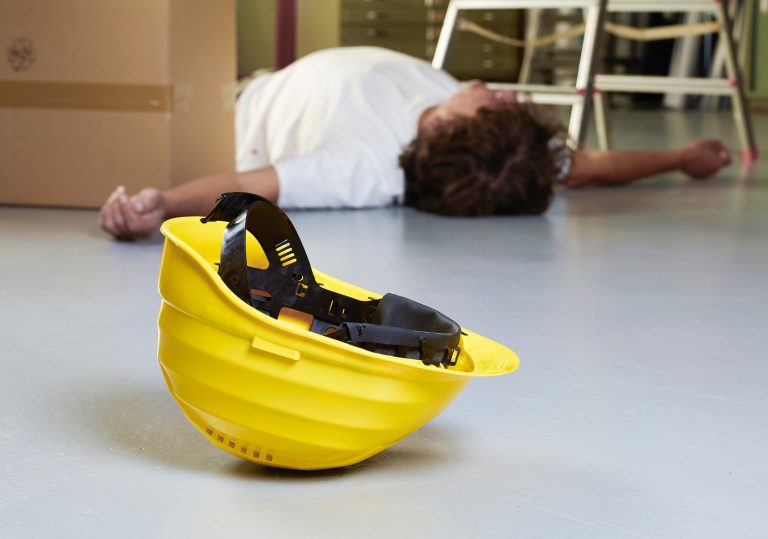BLOG
“Patchy and inadequate” | 8 high health and safety fines handed to employers recently

The coronavirus pandemic has brought workplace health and safety sharply into focus. Having spent over a year implementing and revising infection control measures in line with evolving government guidance, employers are now more aware of their responsibilities and risk management has become embedded into the day-to-day running of organisations. But while the pandemic has raised the profile of health and safety, compliance doesn’t stop at COVID-19.
The following six and seven-figure fines show just how wide employers’ health and safety responsibilities employers are, and the costs of ignoring them.
1. Waste contractor fined £1m after poor route risk assessment
A waste management firm was handed a huge seven figure fine after a refuse collector was fatally injured by his own bin lorry.
The binman was on a refuse collecting round. He was acting as a reversing assistant but was stood in a blind spot for the lorry’s mirrors and on-board camera. He reportedly tripped and fell under the vehicle’s wheels.
An investigation by the Health and Safety Executive (HSE) found that a suitable and sufficient risk assessment hadn’t been carried out for the route. It also found the firm didn’t adequately supervise the route.
HSE guidance says that refuse lorries should only reverse if there is no other option. The court heard that the company, as part of a normal risk assessment, should have planned a route that required no reversing but failed to do so because the responsible staff member was on long-term sick leave.
The prosecution said collection teams were often “left to their own devices” and that route supervision was “patchy and inadequate”.
Enterprise Managed Services Limited pleaded guilty to breaching the Health and Safety at Work etc Act (HSWA) 1974. It was fined £1,020,000 and ordered to pay costs of £60,476.
The HSE said the tragedy “could so easily have been avoided by simply carrying out a suitable and sufficient route risk assessment and identifying where reversing could be avoided”. It added: “Those in control of workplaces are responsible for identifying and implementing suitable methods of working to reduce the need for vehicle reversing.”
Related Content
Do you need support?
Speak to us for an honest, no obligation chat on:
0345 226 8393 Lines are open 9am – 5pm
2. Energy firm fined £533k after poorly planned work at height
An energy business was ordered to pay more than half a million pounds after failing to prevent a worker’s fall from height.
The agency worker was on a platform called a “web”, vacuuming the inside of a turbine blade. He approached the web’s edge and fell some 1.8 metres. HSE investigators found the firm had provided a ladder to access the web but that nothing was on either side of the ladder to prevent falls.
Siemens Gamesa Renewable Energy pleaded guilty to breaching the Work at Height Regulations 2005. It was fined £533,334 and ordered to pay £16,274 in costs.
Speaking on the incident, the HSE said: “Falls from height often result in life-changing or fatal injuries. In most cases, these incidents are needless and could be prevented by properly planning the work to ensure that effective preventative and protective measures are in place such as edge protection or barriers built to the correct standard.”
It added: “This incident could have easily been prevented if the company had installed adequate edge protection to prevent falls.”
The company has since risk assessed the task and identified a method to avoid working at height – by simply rotating the blade 90 degrees. This is best practice as the Work at Height Regulations 2005 make clear that working at height should be avoided where possible due to its hazardous nature.
Falls from height continue to be the number one cause of fatal injury at work, accounting for 29 of the 111 deaths reported in 2019/20.
3. Foundry fined £500k after worker exposure to hand-arm vibration risks
A large foundry was fined after workers were diagnosed with hand arm vibration syndrome (HAVS) following excessive power tool use.
Three employees were diagnosed as having developed HAVS in 2016. Despite the diagnosis, one sufferer continued working with vibrating tools without effective measures being in place to control the risk of further harm. The employees used tools such as hand grinders, air chisels, spindle grinders and jackhammers.
A HSE investigation uncovered that the firm’s vibration risk assessment did not, until 2017, identify each employee’s daily exposure to vibration and did not measure cumulative exposure of using different vibrating tools. Investigators also found inadequate health surveillance was in place and that employees weren’t made aware of HAVS and its debilitating symptoms. Despite the HAVS diagnosis, the company failed to act by adjusting one affected worker’s job, meaning he continued to be exposed to excessive vibration.
Saint-Gobain Construction Products UK Limited pleaded guilty to failing to discharge the duty imposed on it by the HSWA 1974. It was fined £500,000 and ordered to pay costs of £9,453.
The HSE said: “This was an established multinational company that had the resources to protect its workers from the effects of excessive vibration but failed to do so over a long period of time. All employers have a duty to provide effective measures to ensure the health of their staff is not seriously or permanently harmed by the work they are asked to do.”
4. Manufacturer fined £560k after changed cleaning process led to employee’s scalding
A chemical manufacturing company was fined after an employee was scalded during a cleaning operation.
The cleaning process involved washing boiling water down a chemical chute that led to a reaction vessel. Water in the chute was boiled overnight by immersing a steam hose in it. The next day, the employee continued the cleaning process. On opening a valve, he expected the boiling water to drain into the below vessel. However, the vessel had been pressurised with nitrogen gas. When the valve was opened, pressure in the vessel was released and scalding water erupted back up and out of the chute.
HSE investigators found that a relatively safe process of washing the chute down with cold water had changed over time. A practice had developed of boiling water in the chute overnight, while simultaneously pressurising the below reaction vessel as part of a recirculating cleaning cycle. Changes to the cleaning process were not risk assessed in a required risk assessment review. The danger of pressurising a vessel below a chute of boiling water was not recognised. Consequently, no controls were in place to remove the danger.
Calachem Limited pleaded guilty to breaching the HSWA 1974. It was fined £560,000.
The HSE said: “Those in control of working processes have a responsibility to assess the associated risks. If changes are made which increase the level of risk, those in control of the workplace have a duty to reduce the risk back down to as low a level as reasonably practicable.”
It made clear:“ If the decision to boil water in the chute instead of hosing it down with a cold water had been the subject of a risk assessment, the danger from the pressurised vessel below would have been identified prior to the incident. This would have prevented the employee’s severe injury”.
The case acts as a reminder to businesses that systems don’t stay the same over time and that risk assessments should be regularly reviewed, particularly if process changes increase the level of risk.
5. Metal supplier fined £375k after unsafe work system and poor training
A metal supplier was fined after an employee fractured his hand while working with a manual metalworking lathe.
The employee was polishing a metal bar using an emery cloth applied by hand. The cloth became snagged, pulling his hand underneath the rotating bar.
An investigation by the HSE discovered that the employer failed to implement a safe system of using the lathe to refurbish, polish and deburr parts. The employer also failed to provide adequate lathe training and supervision.

Timet UK Limited pleaded guilty to breaching the HSWA 1974. It was fined £375,000 and ordered to pay costs of £16,622.
The HSE said: “This case highlights how employers should ensure they have a safe system of work in place for the operation of all machinery and ensure that adequate information, instruction and training is provided to all who use it.”
6. Construction firm fined £250k after worker’s inexperience led to life-changing injury
A construction company was sentenced after a building site worker suffered life-changing injuries. The self-employed worker, contracted by MJL Contractors, was using a petrol disc-cutter to cut reinforced concrete beams. In doing so, the saw “kicked up” and severely lacerated his arm.
The HSE’s investigation found MJL was responsible for the site’s groundworks, including providing and maintaining the disc-cutter. The contracted worker had not been sufficiently trained to use the disc-cutter. The system of work for cutting reinforced concrete beams wasn’t planned or assessed to ensure risks were properly controlled.
HSE investigators found that the company’s key failure was that it should have been aware the worker had no experience of using the disc-cutter. Investigators said: “This should have been identified and addressed at his induction or at the time the work was allocated to him to complete.”
MJL Contractors Limited was found guilty of breaching the HSWA 1974. It was fined £250,000 with costs of £100,000.
The HSE commented: “This serious incident could have easily been avoided if basic safeguards had been put in place.”
7. Freight operator fined £200k over unsafe system of work
DB Cargo was fined after failing to protect the safety of workers following an incident at its train freight yard. A worker suffered life changing injuries, when a freight train collided with his vehicle on a level crossing at the yard.
The sentence was passed following prosecution by rail regulator, the Office of Rail and Road (ORR). ORR’s prior investigation concluded that DB Cargo had failed to suitably and sufficiently assess the risks associated with the movement of people, vehicles and trains within the yard. As a result, a safe system of work was not implemented to protect workers as they moved around.
Investigators found safety documents had required that vehicles use one of two provided subways to access individual sidings, without crossing any tracks. However, by 2012, this requirement was no longer included in documents. By 2014, only one of the subways remained open and its lighting had failed. Use of the subway wasn’t enforced, so most workers chose to drive across level crossings. There were no barriers, signs or written instructions indicating vehicles weren’t allowed to use the level crossings.

DB Cargo was fined £200,000 and ordered to pay £33,768 in costs after pleading guilty to an offence under the HSWA 1974.
In sentencing, the judge said “there was an obvious risk of a collision between people and trains within the yard, which had been foreseen when the yard was designed”.
The ORR remarked: “These were serious failings by DB Cargo to protect its workers and ensure a safe practice of freight train movements. There were clear and obvious risks of serious injury due to the lack of appropriate ways of working.”
DB Cargo is no stranger to the courts. Last year, the firm was hit with a £1.2 million fine after a boy was electrocuted. In 2019, it was ordered to pay £2.7 million for failing to secure a marshalling yard.
8. Recycling firm fined £220k after manager’s “wilful blindness to risk”
The workers were operating a waste processing line. The line became blocked at various points, including inside a large industrial trommel; the machine uses a large perforated revolving drum to agitate, rotate and sieve waste material.
The two men had stopped the trommel and entered the drum to clear a blockage. A colleague restarted the production line, unaware the pair were inside. The drum revolved for some four minutes before the line was stopped, with the men unable to get out or stop the machine.
The HSE’s investigation confirmed that “numerous failings” with machinery and work practices put employees at risk. Investigators learned that:
- The processing line had a history of blockages, with operators regularly having to enter the trommel to clear material.
- The line was not adequately guarded to prevent access to dangerous parts of machinery.
- Control systems, including emergency stops, did not comply with relevant standards.
- Managers failed to adequately monitor or enforce machinery isolation procedures.
- CCTV showed the provided trommel guarding was regularly bypassed by staff, including the site manager.
Stonegrave Aggregates Limited pleaded guilty to breaching the HSWA 1974 and the Provision and Use of Work Equipment Regulations 1998. It was fined £200,000 and ordered to pay costs of £48,952.
Company director, Bruce Whitley, and site manager, David Basham, both pleaded guilty to an offence contrary to the HSWA 1974, namely the firm’s offence had been committed with their consent or connivance or was attributable to their neglect. Whitley was given a 12-month community order. Basham was given a six-month prison sentence suspended for 12 months.
The prosecution said Whitley should have been “more proactive” in observing procedures on site, describing it as “an offence of omission rather than inaction”. Whitley’s culpability was said to be lower than Basham, who was aware of “short cuts” being regularly taken in work practices. The judge found Basham “sometimes showed a wilful blindness to risk”, possibly “lulled into a false sense of security as there had been no previous accidents or even near misses”.
The judge stressed the penalties weren’t designed to put a value on someone’s life. Rather they are designed to aim at the degree those involved fall short in managing health and safety risks and assessing the potential harm present.
The HSE said: “This case highlights the importance of implementing effective power isolation procedures when interacting with machinery and the need to monitor compliance to make sure these procedures are followed.” It stressed: “HSE will not hesitate to prosecute companies or individuals who fail to implement and monitor safe systems of work.”
Health, Safety & Training Manager, A Smith Gt. Bentley Ltd
Dramatically reduce risk with specialist safety support
Though different in nature, these tragic incidents have one thing in common: they could all have been easily avoided. In most cases, missing or inadequate risk assessments, or assessments that were not acted upon, were the underlying failing that allowed accidents to occur.
Ellis Whittam helps thousands of UK employers to proactively protect their organisation and their people from the serious consequences of non-compliance. To find out out more about our fixed-fee Health & Safety support, call 0345 226 8393 or request your free consultation using the button below.
Sign up for the latest news & insights
Resources
Latest News & Insights

Work from wherever? | Things to consider before allowing employees to work from abroad
BLOG Written by Alexandra Farmer on 25 May 2022 A few years ago, the idea of working from anywhere in the world seemed like a pipe dream.

Reduced workforce? Here’s 5 health and safety areas you need to revisit
BLOG Written by Charles Spencer on 18 May 2022 In 2022, a growing number of businesses have moved, or are in the process of moving,

Fee for Intervention | Why health and safety breaches could cost your business more in 2022
BLOG Written on 16 May 2022 It’s a well-known fact that poor health and safety practices cost businesses money. And with the HSE recently announcing yet another

Remote work isolation | How employers can help combat loneliness
BLOG Written on 12 February 2021 While the benefits of remote work are seemingly boundless, often overlooked is the isolation and disconnectedness that it can

Time off for getting married or moving house
BLOG Written on 12 May 2022 There are certain big life events that can sometimes get in the way of work. Whether it’s a wedding

Recent cases highlight continued work at height failings
BLOG Written on 6 May 2022 Working at height continues to be the leading cause of work-related fatality. According to most recent HSE figures, these

Managing organisational change | How to keep people happy
BLOG Written on 28 February 2022 In the direst of circumstances, humanity’s true capacity for adaptation and perseverance can be realised. Where the business world

5 ways to combat 2022’s recruitment challenges when you can’t pay more
BLOG Written by Christian Vincent and Hannah Copeland on 15 April 2022 In 2022, recruitment and retention are fast becoming employers’ biggest challenges. With people

A war of words | Managing employees’ political views on the Russia-Ukraine conflict
BLOG Written by Lesley Rennie on 13 April 2022 The war in Ukraine, and the daily news reports of fatalities, continues to spark conversation in






